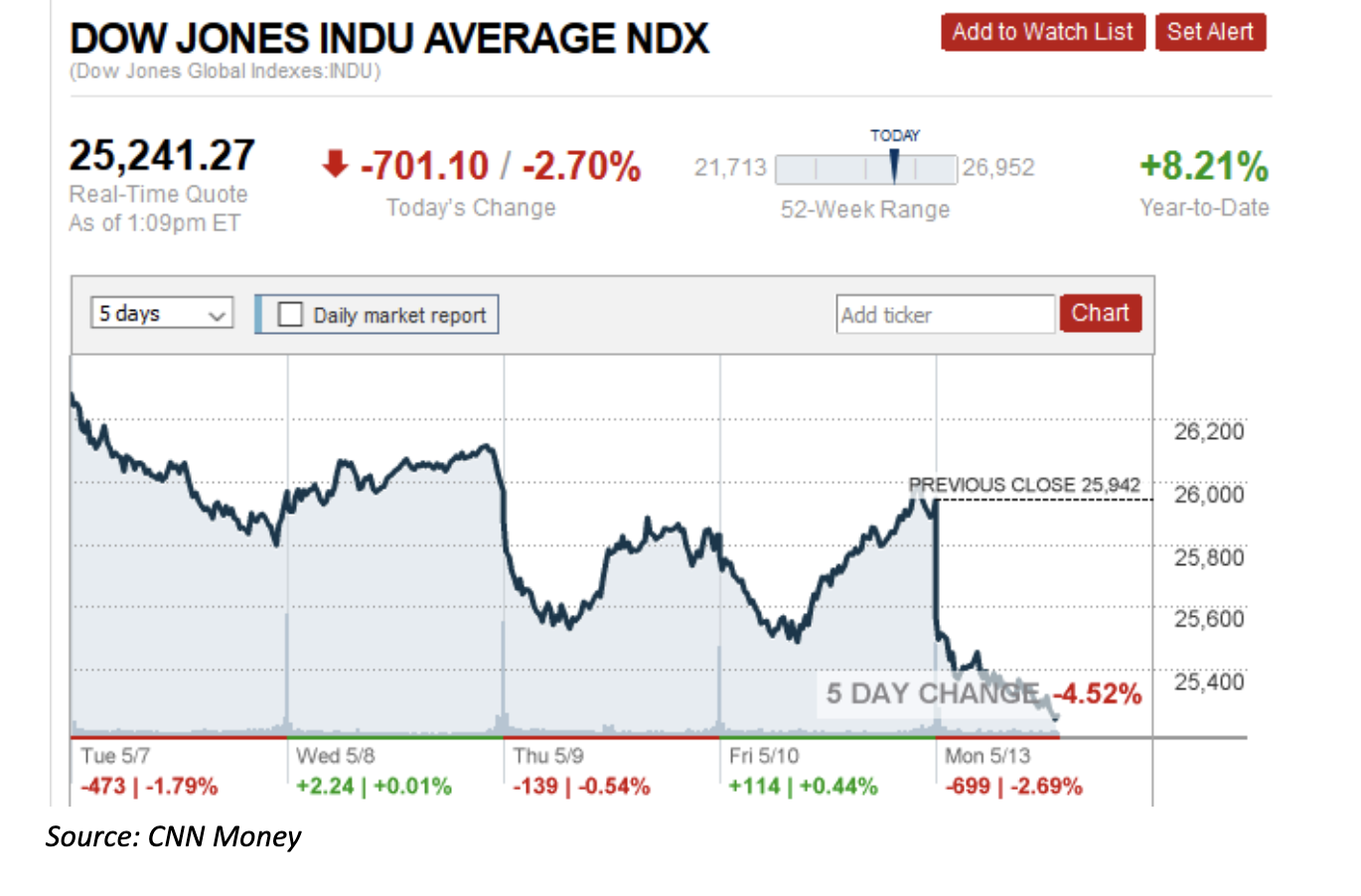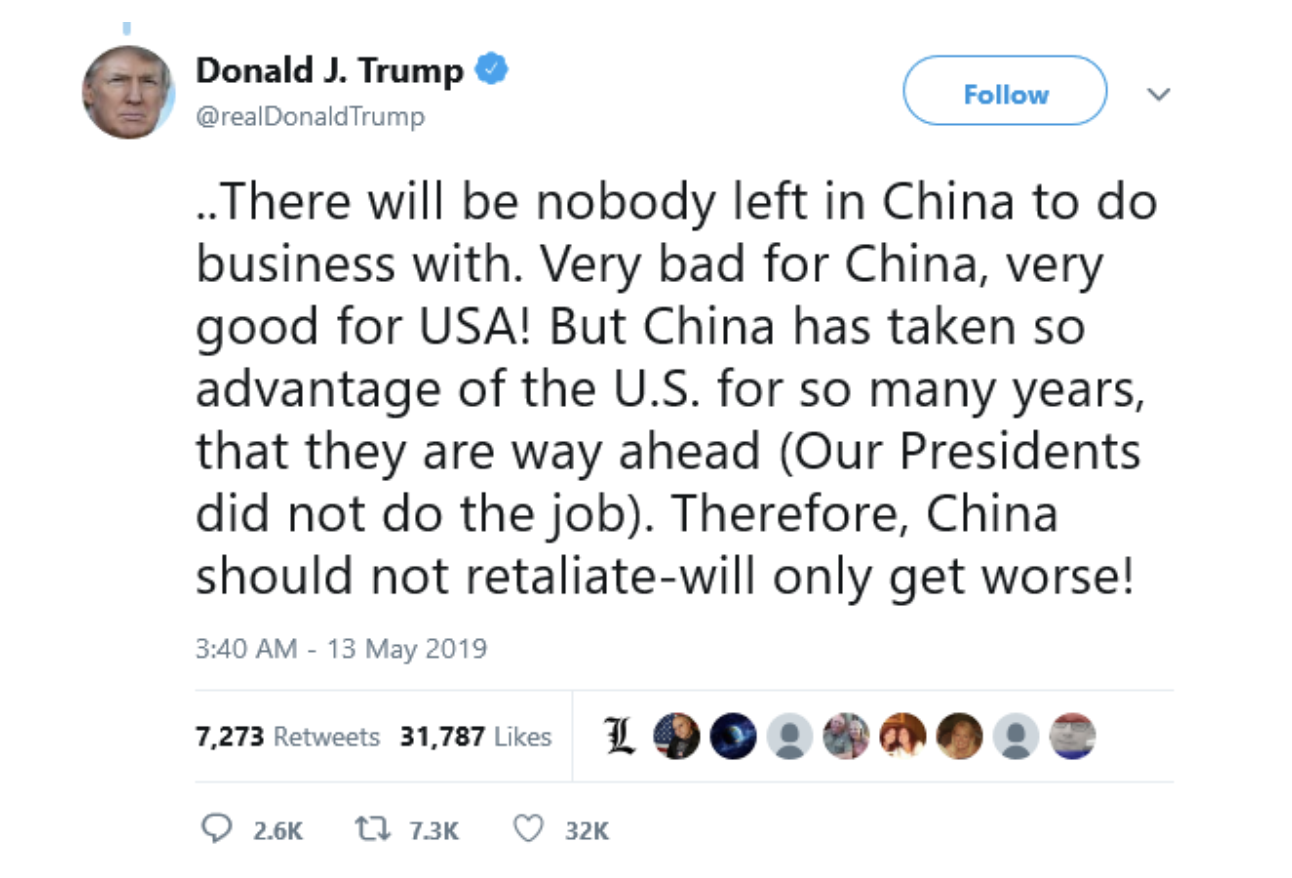In a classic flight-to-safety trade, U.S. equities have opened sharply in the red while gold has gained in early morning trade on Monday after Beijing hit back and announced its own retaliatory tariffs on $60 billion of U.S. products. The Dow Jones has shed nearly 700 points or 2.7 percent to 25,377, its lowest level in two months, with the S&P 500 slipping by a similar margin. Dragging the Dow down are stocks of companies with huge China exposure--Apple, Inc. (NASDAQ:AAPPL) has cratered five percent; Caterpillar,Inc.(NYSE:CAT) is down 4.1 percent, Boeing Corp.(NYSE:BA) has lost 2.9 percent, Cisco Systems (NASDAQ:CSCO) has slipped 2.9 percent while Nike, Inc.(NYSE:NKE) is down 2.2 percent.
Meanwhile, spot gold is flirting with $1,300 per ounce (+1 percent), crossing that psychological level for the first time in seven weeks while bond yields have plummeted as prices increase (bond yields move inversely to prices). The Dollar Index is down 0.3 percent.

(Click to enlarge)

(Click to enlarge)
The new development comes just hours after President Trump took to Twitter and warned China against launching retaliatory tariffs. On Friday, Washington more than doubled tariffs on $200bn of Chinese goods from 10 percent to 25 percent.

(Click to enlarge)
China, however, put on a brave face with the country’s leading envoy to trade talks downplaying the failure to strike a deal and saying negotiations would continue.
Dumping US Debt
The new retaliatory tariffs by Beijing could, however, seriously hurt chances of any deal seeing the light of day. China has hit back hard on the U.S., imposing tariffs of 20-25 percent on 5,140 U.S. products including food products, industrial chemicals and consumer electronics.
Yet, the new tariffs might soon appear relatively tame if Beijing goes through with a more insidious plan.
Related: Ireland Declares Climate Emergency
As Beijing runs out of tools with which to put Washington under pressure, it’s coming up with more novel mechanisms to achieve its purposes. The Guardian has reported there are hints that China is contemplating dumping U.S. Treasuries, a move that could have serious repercussions on interest rates. China is the U.S.’ top creditor, holding $1.13 trillion of government paper or 17.7 percent of U.S.’ foreign debt.
China has actually been reducing its holdings of U.S. debt since 2013 when it held a record $1.3 trillion. That the country continues to own so much U.S. debt is actually by design. Beijing has always badly wanted to make the yuan the pre-eminent currency for use in global trade instead of the dollar. To achieve this, Beijing makes sure the yuan remains in a position of relative weakness to the dollar so as to make its exports more competitive. Whenever the dollar falls, the Chinese government uses yuan to purchase more U.S. Treasuries which in turn increases demand for the dollar and raises its value.
Being America’s biggest banker also confers serious political leverage to China. Every now and then, Beijing threatens to dump its U.S. debt holdings in a bid to force interest rates to rise and wreck the economy.
Beijing would be careful how it goes about this because calling all its debt at once would seriously weaken the dollar and disrupt international markets including its own. To avoid shooting itself in the foot, Beijing would have to first expand its export markets especially to countries in the region to replace whatever exports it would lose if Americans started buying less of its products after the dollar weakened relative to the yuan.
Recession risk increases
But make no mistake about it, what we are witnessing is a very serious escalation of the trade war. Last week’s breakdown might not be a small blip as many have supposed since China appears very willing to go toe-to-toe with the U.S.
A deal could still eventually happen but the whole process is likely to drag on for longer than anticipated and roil the markets and even possibly trigger a full-blown recession as BofA has warned.
By Fred Dunkley for Safehaven.com
More Top Reads From Safehaven.com:
















